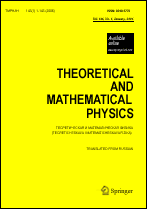|
This article is cited in 16 scientific papers (total in 16 papers)
Differences of idempotents in $C^*$-algebras and the quantum Hall effect
A. M. Bikchentaev
Kazan (Volga Region) Federal University, Kazan, Russia
Abstract:
Let $\varphi$ be a trace on the unital $C^*$-algebra $\mathcal{A}$ and $\mathfrak{M}_{\varphi}$ be
the ideal of the definition of the trace $\varphi$. We obtain a $C^*$ analogue
of the quantum Hall effect: if $P,Q\in\mathcal{A}$ are idempotents and
$P-Q\in\mathfrak{M}_{\varphi}$, then $\varphi((P-Q)^{2n+1})=\varphi (P-Q)\in \mathbb{R}$ for all
$n\in\mathbb{N}$. Let the isometries $U\in\mathcal{A}$ and $A=A^*\in\mathcal{A}$ be such that $I+A$
is invertible and $U-A\in\mathfrak{M}_{\varphi}$ with $\varphi (U-A)\in \mathbb{R}$. Then $I-A,\,I-U
\in\mathfrak{M}_{\varphi}$ and $\varphi (I-U)\in \mathbb{R}$. Let $n\in\mathbb{N}$, $\dim \mathcal{H}=2n+1$, the symmetry operators $U,V\in\mathcal{B}(\mathcal{H})$, and $W=U-V$. Then the operator
$W$ is not a symmetry, and if $V=V^*$, then the operator $W$ is nonunitary.
Keywords:
Hilbert space, linear operator, idempotent, symmetry, projection, unitary operator, trace-class operator, $C^*$-algebra, trace, quantum Hall effect.
Received: 09.02.2017
Citation:
A. M. Bikchentaev, “Differences of idempotents in $C^*$-algebras and the quantum Hall effect”, TMF, 195:1 (2018), 75–80; Theoret. and Math. Phys., 195:1 (2018), 557–562
Linking options:
https://www.mathnet.ru/eng/tmf9351https://doi.org/10.4213/tmf9351 https://www.mathnet.ru/eng/tmf/v195/i1/p75
|


|




 Contact us:
Contact us: Terms of Use
Terms of Use
 Registration to the website
Registration to the website Logotypes
Logotypes








 Citation in format
Citation in format 
